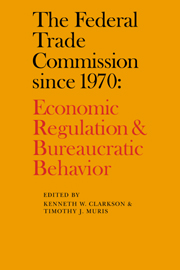Book contents
- Frontmatter
- Contents
- List of contributors
- Preface
- 1 Introduction
- Part I The institutional setting
- Introduction
- 2 Statutory powers
- 3 Legislative constraints
- 4 Judicial constraints
- 5 Executive constraints
- Part II Nature and consequence of FTC actions
- Part III Conclusions and reforms
- Notes
- Selected bibliography
- Index
3 - Legislative constraints
Published online by Cambridge University Press: 05 November 2011
- Frontmatter
- Contents
- List of contributors
- Preface
- 1 Introduction
- Part I The institutional setting
- Introduction
- 2 Statutory powers
- 3 Legislative constraints
- 4 Judicial constraints
- 5 Executive constraints
- Part II Nature and consequence of FTC actions
- Part III Conclusions and reforms
- Notes
- Selected bibliography
- Index
Summary
This chapter discusses congressional constraints on the FTC. Section I discusses the major methods of congressional constraints. Section II then turns to the nature of congressional incentives to control the FTC, focusing on the interest groups that influence Congress and the Commission. Finally, Section III considers the legislative veto, the most widely discussed means of modifying congressional control of the FTC.
Congressional authority and monitoring
Congressional authority, oversight, and monitoring of the FTC comprise four major categories. First, Congress may shape the agency through the annual authorization and appropriation process. Second, Congress can engage in overall surveillance of the agency through questionnaires, investigations, and hearings. Third, Congress may focus at any time on specific issues, a process we refer to as “ad hoc monitoring.” Finally, Congress may change the legislative authority of the Commission.
Congressional authorization and appropriation
Some scholars contend that, in terms of influence and the ease with which that influence can be employed, control over the budget is Congress's most effective constraint over agencies. By this view, Congress influences agencies both by adjusting the total funds appropriated to the agency as well as by allocating expenditures within various agency programs. For example, Congress may encourage particular policies by “ear marking” funds or discourage other policies by limiting the use of funds or the number of agency personnel. Specific FTC examples include congressional earmarking of separate funds for truth-in-lending enforcement in fiscal years 1969 and 1970 and for the study of the oil industry following the energy crisis of 1973–4.
- Type
- Chapter
- Information
- The Federal Trade Commission since 1970Economic Regulation and Bureaucratic Behavior, pp. 18 - 34Publisher: Cambridge University PressPrint publication year: 1981
- 1
- Cited by



